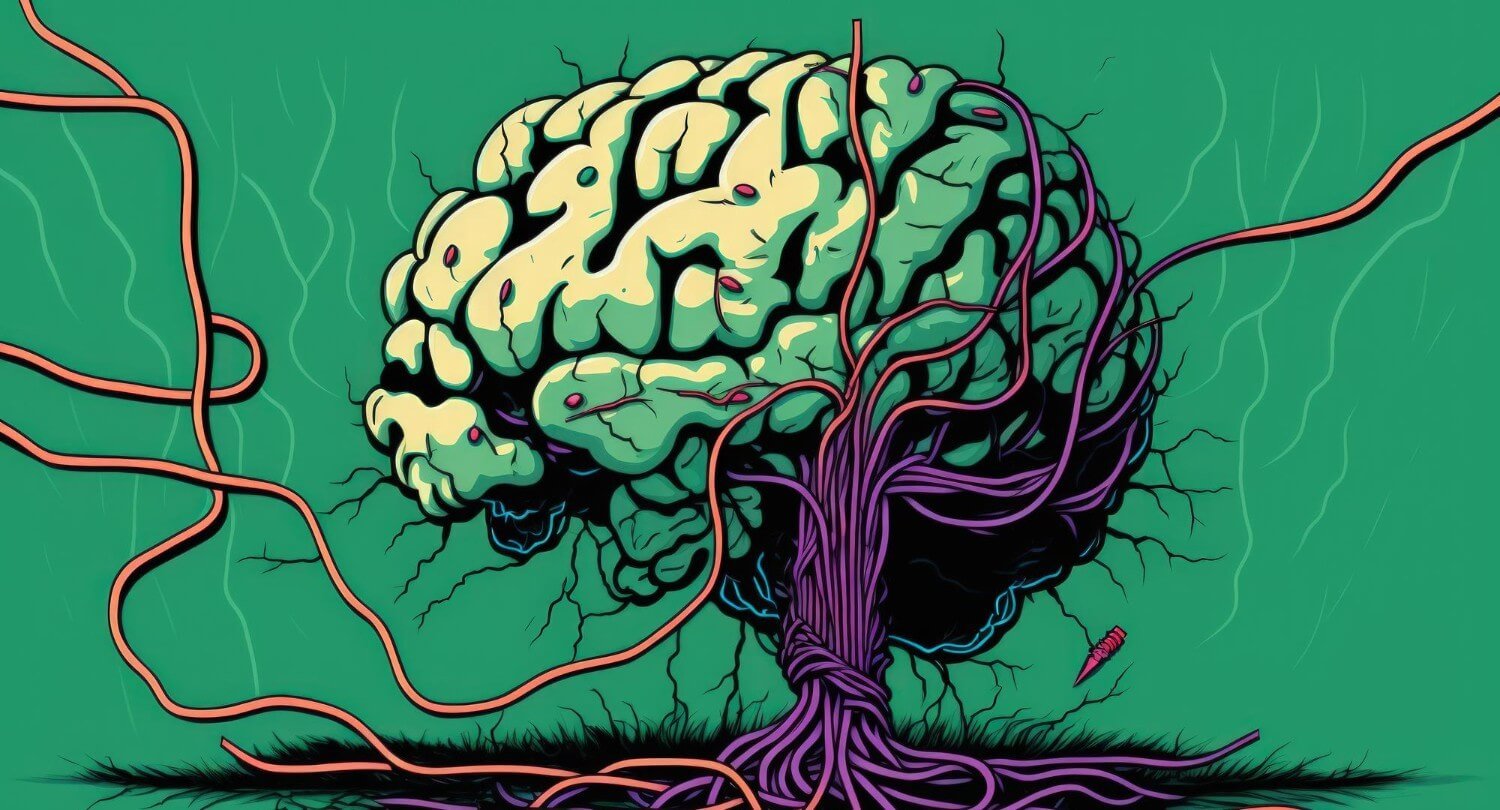The effects of cannabinoids on the brain has been a hot research topic in recent years.
In particular, there is debate around potential long-term impacts of tetrahydrocannabinol (THC) on thinking, emotions, and mental health. In this article, we’ll delve into the scientific findings on how cannabinoids can influence cognitive functions.
The Cognitive Consequences of Cannabinoid Consumption
The effects of cannabinoids on the brain have been studied for decades. And now, there is enough scientific evidence that researchers can spot general trends regarding how marijuana consumption impacts thinking (referred to in the literature as “cognition”).
One way scientists examine large amounts of data is a technique called meta-analysis.
In short, a meta-analysis involves systematically assessing previous studies to draw conclusions about a larger body of research.
A Landmark Study on Marijuana and Cognition
In the case of the effects of cannabis on the brain, a pivotal study was published in the January 2022 edition of the scientific journal, Addiction. The paper was titled, Evidence on the acute and residual neurocognitive effects of cannabis use in adolescents and adults: a systematic meta-review of meta-analyses.
Now. That title is a bit of a mouthful. But it’s not as complicated as it sounds.
Essentially, this paper condensed decades of research into a relatively easy-to-understand (for scientific research at least!) summary of the effects of cannabis on the brain.
The Verdict:
Cannabis use “leads to small to moderate deficits in several cognitive domains.” And in the areas affected, users may continue to have impaired thinking even after stopping cannabis consumption (referred to as “residual effects”).
An important point highlighted in the study was that adolescents seem especially sensitive to both the short and long-term negative effects of cannabis on cognition.
Specific Cognitive Domains Impacted by Cannabinoids
While researchers sometimes talk about cognition as a whole (often referred to as “global cognition”), it is generally separated into several key domains. This allows for a more careful and nuanced assessment of the different aspects of cognition..
The 2022 meta-analysis mentioned previously analyzed evidence in 5 different areas of cognition.
Executive Functions
Often called “higher-level thinking,” executive functions involve more complex areas of thought, like decision-making, flexibility, reasoning, and emotional regulation.
Cannabis was found to negatively impact overall executive functioning. The effect was worse for chronic cannabis users and those who began using at an early age.
Learning and Memory
Developing and applying new skills relies on the ability to learn new concepts and then commit them to memory. Learning and memory can be split into several areas, including verbal, visual, and prospective (planning to perform an action in the future).
Evidence on cannabis’ effect on learning and memory is mixed.It doesn’t seem to affect visual learning and memory. However, regular cannabis use had negative short and long-term effects on verbal and prospective learning and memory.
Processing Speed
Processing speed describes how quickly the brain can receive, interpret, and respond to new information.
As you might expect, acute (short-term) cannabis intoxication significantly impairs processing speed. But the negative impact seems to wear off after a period of abstinence.
Perceptual Motor Function
The link between the brain and movement (motor function) is an essential component of cognition. This domain is what allows people to safely do things like drive a car or be skilled at sports.
The evidence suggests cannabis use hurts the performance of simple movement skills soon after intake. However, no residual impacts were noted after abstinence.
Language
Many areas of learning and communication rely on the ability to effectively interpret and use language.
Overall, it seems cannabis does not have a negative effect on language.
The Youthful Brain: A Special Concern
A clear message about the effects of cannabinoids on the brain is that young people are especially vulnerable to harm.
Cannabis use doesn’t just have a bigger short-term negative impact on the cognition of young people. It also appears that these problems with thinking and emotions can extend beyond the teen years through to early adulthood, and even into mid-life.
It’s also clear that the earlier a person begins using cannabis and the heavier their use, the worse outcomes tend to be.
While this is a complex subject that’s still being researched, two broad factors that explain why cannabis use can be particularly harmful to youth.
- The human brain undergoes a tremendous amount of growth until an individual’s early 20s.
The physical size, structure, and quality of neural connections in a young person’s brain are growing at an incredibly fast rate in all young people.
Cannabis use can disrupt this growth, especially in areas like the prefrontal cortex (PFC), responsible for high-order cognitive abilities.
Brain scan studies show marijuana can lead to changes in the structure of the brains of young people, which could affect cognitive functioning later in life.
- Cognition greatly impacts academic, social, and emotional development.
While perhaps not as permanent as structural changes to the brain, the foundations that are laid in adolescence in areas like schooling, relationships, substance use, and mental health tend to persist into adulthood.
By impairing cognition, marijuana use can negatively affect a young person’s overall functioning and achievement in many areas of life. This can set the stage for life-long problems that are incredibly difficult to overcome, even after abstaining from further marijuana consumption.
The Recovery Debate: Can the Brain Bounce Back?
The short-term effects of cannabinoids on the brain are reasonably well understood. But there’s uncertainty in the scientific community about if these negative impacts go away once a person stops using cannabis.
Specific challenges in finding clear answers on this topic include:
- Long study periods. To properly test if the brain can recover from cannabis use people need to be followed up for a long time (think years, not months).
- Assessing abstinence. Particularly with long-term studies of regular heavy cannabis users, assessing abstinence can be a challenge. For example, if someone slips up once are they excluded from the study? Or what about if they relapse into heavy use for 1 month and then stop again?
- Individual differences. Cognitive damage from marijuana can show up in a variety of different ways. In some people, it may cause difficulty with relationships and employment. Whereas in others, challenges with emotions and mental health might be the biggest concern.
Bottom Line: We know the brain can recover from harm caused by cannabis. However, the extent of recovery and how long this could take depends on a variety of factors.
Factors that Impact Recovery
Factors that increase the risk of lasting harm to the brain from cannabis use include:
- Cannabis use at a young age
- Heavy and frequent use
- Duration of use (how long a person has used cannabis)
- Pre-existing mental health and/or cognitive issues
- Other drug use (including alcohol)
Generally speaking, these factors influence the harmful effects of cannabinoids on the brain in a bidirectional manner.
That is, as the factors above increase, so does the risk of lasting harm. And as they decrease, the risk of harm to the brain is reduced.
The Way Forward: Prevention and Education
Cannabinoids occupy an interesting space when it comes to harm prevention and education.
Over the past decade, legal restrictions around the recreational and medical use of marijuana have been relaxed in several countries. Research shows that as this trend has progressed, people have developed more positive health perceptions of cannabis use.
This is likely partly due to the increasing discovery of legitimate therapeutic benefits of marijuana for certain health conditions. And a recognition that as far as a hierarchy of risk for harm, cannabis is undoubtedly lower on the scale compared to other drugs.
However, neither of these issues means that the effects of cannabis on the brain can’t be harmful.
Like alcohol and tobacco, unsafe use of cannabinoids can lead to a range of physical and mental health problems. But for a variety of reasons, public health efforts around prevention and education haven’t quite kept pace with societal changes.
To reduce the risk of cannabis-related harm, it’s essential now that governments and public health authorities prioritize contemporary, research-based interventions to discourage harmful levels of cannabis use among young people.
While we can’t copy the models exactly, public health initiatives for alcohol and tobacco give a good “roadmap” for the types of educational campaigns and interventions that are likely to be effective for cannabis.
Conclusion
Cannabinoids are a group of compounds found in the marijuana plant. THC is the most well-known and studied cannabinoid, being primarily responsible for the intoxicating effect of cannabis.
With relaxing restrictions around cannabis for both recreational and medical use, there has been substantial interest in recent years around the effects of cannabinoids on the brain.
While research shows cannabinoids may be helpful for certain brain disorders, it’s also clear certain patterns of use can be harmful.
In particular, when cannabis is used at high doses, frequently, over an extended period, it can impair several areas of cognitive function.
The areas of cognition most impacted are executive functions, learning and memory, processing speed, perceptual motor function, and language. Cannabis use impairs functioning in all these areas over the short term, and it may even have long-term effects that persist after a person decides to abstain.
The fact that cannabis misuse is particularly harmful to young brains is of particular concern. Studies have shown that the developing brains of teens can undergo structural changes from harmful levels of cannabis use, which persist well into adulthood.
Despite increasing knowledge about the effects of cannabis on the brain, continued research is still required to fully understand this important topic.
For now, anyone partaking in recreational or medical use of cannabinoids should stay informed. Education from reliable sources is the best way to make safe decisions around cannabis use that apply to your particular circumstances.
FAQs
How do cannabinoids affect memory and concentration?
During periods of acute intoxication, cannabinoids negatively impact memory and concentration. Studies in this area show people under the influence of cannabis routinely perform worse on memory and concentration-based tasks.
This negative impact of cannabinoids on memory and concentration seems to be prolonged in long-term heavy users, persisting even during periods of abstinence.
Is the brain damage from cannabis permanent?
It can be. Studies conducting brain scans on adults who used cannabis heavily as teens show a pattern of changes to the structure and function of certain brain regions. In particular, the prefrontal cortex, which is responsible for high-order cognitive functions, seems impacted.
Also, keep in mind that cognitive difficulties faced by youth and adults who misuse cannabis can have a lasting impact. Problems with education, work, relationships, and mental health caused by harmful cannabis use aren’t easily overcome and can turn into life-long struggles for the affected person.
What organ is affected by cannabinoids?
While the ECS has receptors throughout the body, THC—the main psychoactive ingredient of marijuana—is mainly active in CB1 receptors in the brain. These receptors modulate a variety of functions, such as hunger, emotions, and learning.
When consumed via marijuana or a cannabis product, THC acts as an endogenous (external) cannabinoid. Prolonged and high levels of THC use can upset the fine balance of the ECS, which in turn can be harmful to the brain.





